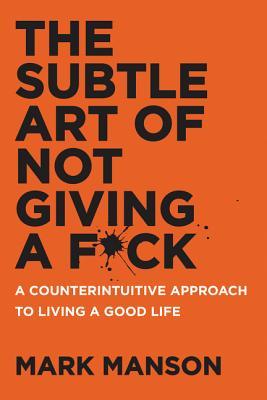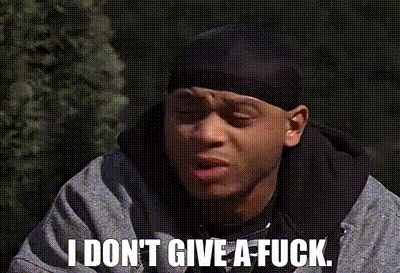 Sometimes, the perfect book enters your life at just the right moment. That was the case for me with Mark Manson’s The Subtle Art Of Not Giving A F*ck, a provocatively (but aptly) titled tome which I first read in early 2019. It was a time of great upheaval for me personally: an intense but short-lived relationship had just ended, and the messages conveyed within these 216 pages spurned me on to relocate to Manchester, where - almost without trying - I landed a new job, a new house, a wife and a child. Within a year.
Sometimes, the perfect book enters your life at just the right moment. That was the case for me with Mark Manson’s The Subtle Art Of Not Giving A F*ck, a provocatively (but aptly) titled tome which I first read in early 2019. It was a time of great upheaval for me personally: an intense but short-lived relationship had just ended, and the messages conveyed within these 216 pages spurned me on to relocate to Manchester, where - almost without trying - I landed a new job, a new house, a wife and a child. Within a year.
While the book’s title might seem nihilistic, it’s not about “not giving a fuck”. The “subtle art” that’s outlined in the title is the art of “giving a fuck” about fewer, more important things, and not sweating the infinite other ways that life could have taken us.
Breaking the “Feedback Loop from Hell”
Most of us have our hang-ups. Many of us are even aware of what they are. Yet they continue to confound us on almost a daily basis: You’re aware that you’re anxious, and this in turn makes you more anxious. (Replace “anxious” with “lacking sleep” and you’ll get the idea of what my life has been like for the past couple of years.) This “Feedback Loop from Hell” drives our consciousness loopy, and we often try to paper over the cracks by following self-help advice, chasing happiness, or trying to fix everything that seems broken. But the more we pursue happiness (or anything else that we might be chasing), the more we’re aware that we don’t have it yet, and again the mind begins to implode.
The fix, then, is to accept a series of hard truths.
- In all likelihood, you’re not that special - not when graded on a curve of the entirety of humanity, over the history of time. And that’s fine. It allows us to have a more measured sense of self-worth, rather than living up to a fantasy of self-entitlement.
- There will always be pain and struggles in life. The trick is learning which struggles to accept (which ones we’re powerless to fix, even if we wanted to) and which ones to direct our energies on.
- Some of our most common values - such as chasing pleasure, material success, or remaining eternally positive - are actually the most harmful. If you’re working evenings and weekends and you’re already sufficiently well-off, what are you actually doing with your life?
- As discussed in Four Thousand Weeks, everything that we do (or don’t do) is a choice, of some degree of importance (which we may or may not “give a fuck” about). We should own our choices, whilst simultaneously accept that there are certain tragedies which we can’t take responsibility for - the only thing we can affect is how we react to them.
Failure is the way forward
Our minds are often risk-averse. It’s part of our survival mechanism. (Want to wrestle that bear? Probably not a great idea.) But in our everyday lives, our minds often hold us back from taking chances where the risk is comparatively small, as Manson shares from his own experience:
I asked myself a simple question: “Would I rather make decent money and work a job I hated, or play at Internet entrepreneur and be broke for a while?” The answer was immediate and clear for me: the latter. I then asked myself, “If I try this thing and fail in a few years and have to go get a job anyway, will I have really lost anything?” The answer was no. Instead of a broke and unemployed twenty-two-year-old with no experience, I’d be a broke and unemployed twenty-five-year-old with no experience. Who cares?
Improvement comes by learning from thousands of tiny failures, the sort of which we’re being conditioned to avoid by only seeing the “perfect selves” that people portray on television or social media. Pain is a part of the process, and we often go out of our way to avoid it, when in reality the best approach is “just shut up and get on with it”. Manson shares a piece of advice from his high school math teacher, Mr Packwood: Don’t just sit there. Do something. The answers will follow.
Getting more done by saying no
In the politeness-obsessed West, we’re trained to avoid rejection - both giving it and receiving it. We’d rather nod and smile weakly, even if it means committing to activities that we don’t really want to invest in, and in doing so we deny ourselves the ability to make our best choice. But every rejection is a recognition that we are choosing to “give a fuck” about something else, something that we’re happier to be emotionally invested in.
But what about when dealing with people that you love? Here, too, you need to foster a relationship where each person is willing to reject and be rejected. In turn, this means taking responsibility for their own actions and decisions, and understanding the boundaries each other’s responsibilities. (Which is to say, don’t expect other people to take responsibility for your problems, nor try to take responsibility for theirs.)
Incidentally, despite the f-words flying around throughout the book, it’s a title which is extremely positive when it comes to long-term job and relationship commitments, when built on a trusting foundation. Commitment, the book concludes, is the ultimate form of choice, and - when done correctly - eases your decision-making burden, as it shuts down entire avenues of other “what ifs” and allows you to focus more on the things that you have chosen to “give a fuck” about.
Key takeaways 📝
- Life isn’t perfect. The sooner you acknowledge it, the more freedom you gain.
- Responsible failure is the key to getting ahead.
- Just do it.

